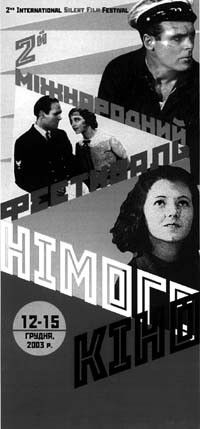Seven countries presented their films for showing in Ukraine’s capital. The audience will have a chance to see films by renowned directors Frank Capra, Mykola Shpikovsky, Aki Kaurismaki, and others. The films were shot in 1920s, the period when the main movie genres had been formed: drama, comedy, adventure, along with the beginning of animation. In Italy, Germany, France, Russia, and the United States, there appeared a number of experimental trends, editing pursuit, etc. For example, within the framework of avant-gardism abstract animations were being shot along with so-called colored (Black) music, collages, and surrealistic films. Gradually the development of the expressive means used by silent movies’ authors came to a stage where they found mimic and gesture alone insufficient. A goal was set to the composers to create more complex scores, and by 1930s the Great Silent became history, supplanted by sound films with their own actual sound, sound effects, and dialog.
The Kyiv festival’s program includes many interesting pictures with diverse plots and topics. They are planning to reproduce the atmosphere of the bygone time when the screen was silent and music was played in the auditorium to help the public’s perception. A special musical accompaniment matching each film will be rendered by Ukrainian performers. French composer Anne Marie Fijal, who wrote the score for F. W. Murnau’s The Burning Soil, was invited to the festival as a special guest.
Kyiv viewers will see Jacques Feyde’s Children’s Faces and Jean Choux’s The Calling of Andre Carel (Switzerland), The Submarine by Frank Capra (the United States), Ex-Serviceman by Bela Balog (Hungary), Aki Kaurismaki’s Juha (Finland), and Self-Seeker by Mykola Shpikovsky (Ukraine). Incidentally, Shpikovsky’s debuted in a 1925 comedy Chess Fever as a script writer and co-director with the Soviet cinema classic Vsevolod Pudovkin. Shpikovsky directed numerous films and wrote scripts for many documentaries and educational films. The Self-Seeker was shot in 1926. After it, the director added to his record A Cup of Tea, Familiar Face, Hegemon, Three Neighbors, etc. During World War II, Shpikovsky was editor of the Front Department of the Central Newsreel Studio. It is due to him and his colleagues, military cameramen and journalists, that we are able to see various faces of the war. Together with Yuly Raizman, Mykola Shpikovsky created the documentaries On the Armistice with Finland and Berlin. In the postwar years he made In the Fields of the Kuban, Daughter of the Maly Theater, A Bouquet, and other works illustrating the Soviet Union’s life at that time.
The First International Silent Movies Festival took place in Kyiv two years ago. Now it is held with the support of the embassies of Finland, Hungary, the Netherlands, and Switzerland along with the French Cultural Center, Goethe Institute, and Swiss Cultural Program in Ukraine.







